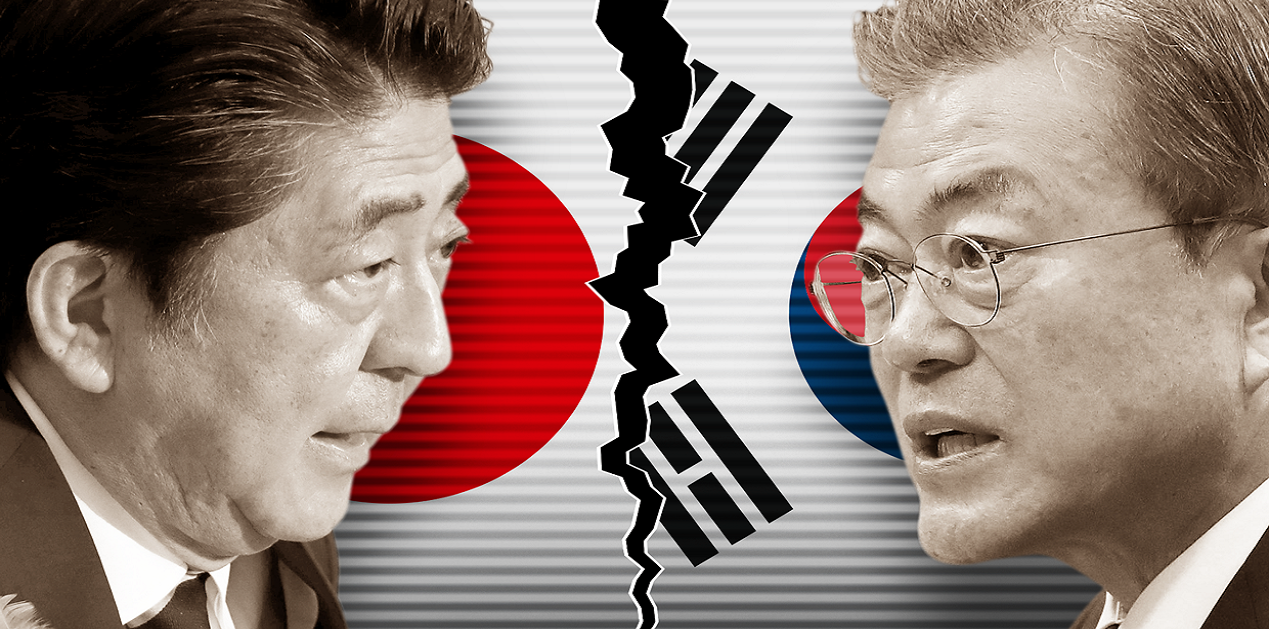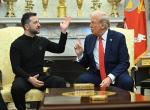On the margins of the ongoing trade war between China and the United States, Japan and South Korea are also involved in a similar tiff. As in any economic conflict, one country tries to strong-arm the other, Japan has been using its leverage to assert its position.
The major catalyst of this rift was the Japanese government making it mandatory for its companies to gain license for exporting materials like hydrogen fluoride, photoresists and fluorinated polyimides to South Korea. All these materials are key component in the making of chips for phones and other electronic instruments. Gaining such a license may take up to 90 days. However, earlier South Korea was not on such a mandatory license list.1 To further complicate the issue the Japanese government decided to remove South Korea from the ‘white list’ of exporting nations. 2 The removal of South Korea from the ‘white list’ will come in effect from August end.3 A failure or delay to acquire these materials can severely affect the South Korean economy and industry.
The primary argument extended by Tokyo for its decisions is that it is concerned about the transfer of sensitive material to North Korea as this can help in developing chemical weapons.4 However, it is becoming difficult for Japan to argue on such security lines. Keeping in view the developments in the last few months, the general argument is that the decision is rooted in the historical narrative. The primary catalyst for the Japanese decision has been the judgment by the South Korean Supreme Court that Japan should pay the due to the South Korean workers who were employed in Japanese industries during the World War II. On the other hand Japan firmly believes that the issue was settled once and for all when the relations were normalized by the treaty signed between the two countries in 1965.5 The situation has become extremely volatile as the South Korean workers are trying to seize the assets of some of the prominent Japanese companies like Mitsubishi Heavy Industry.6
In addition to this, the issues of “comfort women” has also come the forefront. It is a well known fact that South Korean women were forced to undertake sex work during the World War II. Tokyo has apologized for this and had also established a fund of 9.4 million dollars to help these women.7 However, as a result of the recent tensions Seoul has decided to discontinue this fund which has further angered Tokyo. The war time atrocities committed by Japan on South Korea are well known and it also has the capacity to flare up anytime. These animosities tend to continue to simmer and take center stage whenever tensions start to build up. Such sentiments also garner strong nationalistic sentiments and thus appear to be backed by popular support.
This trade war will have adverse affect for both the economies in the long run. As per some calculations this decision will affect the South Korean GDP to amounts of 35 billion dollars as semiconductor chips comprise of 25 percent of Seoul’s exports.8 South Korean firms like LG, Samsung will be greatly affected but it can also push Seoul to stop the export of OLED screens to Japan, a move which can affect Japanese capacity to produce sophisticated televisions.9 Thus it is quite obvious that neither side is gaining anything substantial economically. Another aspect is if the problem continues it may add to increasing prices of the commodities in the global market and further deteriorating the already high strung economic environment, due to the ongoing trade war between Washington and Beijing.
While discussing the ongoing restrictions imposed by Japan, South Korean President Moon Jae-in said that such actions affect the bilateral economic framework of interdependence and coexistence developed over the last 50 years.10 This issue also has the capacity to affect the global trade.
Both Japan and South Korea are closest allies of the United States. Even though President Trump has not shown any preferential approach towards either, it is reported that Moon had asked the United States to get involved. 11 However, it will be a tough call on the part of Washington. Keeping in view the ongoing developments on the Korean Peninsula and Trump’s keenness to look for a solution, he may not be in a position to choose one over the other. 12
Domestic politics of the feuding nations also had a major role to play in the delaying of any talks and solutions. Shinzo Abe had the upper house elections scheduled for July 21 which he won, while Moon has upcoming elections in April 2020. The leaders will be careful not to look weak and would not be interested in conceding anything which may affect the results. 13 The recent accusations that the defence forces of both sides have become assertive and this has further deteriorated the situation.14
Keeping the larger regional politics in view, the recent tensions between Japan and South Korea can affect the overall regional stability. Both the countries shared a lot of common goals and shared global views. They are very close allies of the United States and both have a lot to gain from the denuclearisation of the Korean Peninsula. They also have common territorial and historical enmity with Beijing. If they continue to fight and the relations deteriorate further the major gain will go to China. This will give Beijing an important opening to gain further economic and diplomatic leverage. The more the region is divided the more it helps China in extending its agenda of regional dominance.
References
- https://www.worldpoliticsreview.com/trend-lines/28042/south-korea-and-japan-are-embroiled-in-a-trade-war-can-the-u-s-step-in
- https://www.cnbc.com/2019/07/17/south-korea-japan-trade-war-risks-escalation-impact-on-tech-firms.html
- https://www.cnbc.com/2019/07/08/japan-south-korea-tensions-appear-set-to-drag-down-trade.html
- https://www.washingtonpost.com/world/asia_pacific/south-korea-warns-of-emergency-as-spat-escalates-between-us-allies/2019/07/10/a9099e20-a2e7-11e9-a767-d7ab84aef3e9_story.html?noredirect=on&utm_term=.6e59d91d275c
- https://www.scmp.com/week-asia/geopolitics/article/3016980/japan-south-korea-trade-war-has-tokyo-shot-itself-foot
- https://www.bing.com/search?q=scmp.com%2Fnews%2Fasia%2Feast-asia%2Farticle%2F3019427%2Ftempers-flare-talks-between-tokyo-and-seoul-japan-warns&form=EDGEAR&qs=PF&cvid=5330e1f74aa54597a5f97440341ad685&cc=US&setlang=en-US
- https://www.cnbc.com/2019/07/08/japan-south-korea-tensions-appear-set-to-drag-down-trade.html
- https://www.latimes.com/world-nation/story/2019-07-21/japan-trade-restrictions-hit-south-korea
- https://www.scmp.com/week-asia/geopolitics/article/3017918/how-china-can-win-trade-war-between-japan-and-south-korea
- https://www.latimes.com/world-nation/story/2019-07-21/japan-trade-restrictions-hit-south-korea
- https://www.reuters.com/article/us-southkorea-japan-laborers-trump/trump-offers-to-help-ease-tension-in-japan-south-korea-dispute-idUSKCN1UE248
- https://www.washingtonpost.com/world/asia_pacific/south-korea-warns-of-emergency-as-spat-escalates-between-us-allies/2019/07/10/a9099e20-a2e7-11e9-a767-d7ab84aef3e9_story.html?noredirect=on&utm_term=.fd58a78444f3
- https://www.cnbc.com/2019/07/08/japan-south-korea-tensions-appear-set-to-drag-down-trade.html
- https://www.japantimes.co.jp/opinion/2019/01/31/commentary/japan-commentary/fallout-japan-south-korea-tensions/
(The paper is the author’s individual scholastic articulation. The author certifies that the article/paper is original in content, unpublished and it has not been submitted for publication/web upload elsewhere, and that the facts and figures quoted are duly referenced, as needed, and are believed to be correct). (The paper does not necessarily represent the organisational stance... More >>
Image Source: https://www.ft.com/__origami/service/image/v2/images/raw/https%3A%2F%2Fs3-ap-northeast-1.amazonaws.com%2Fpsh-ex-ftnikkei-3937bb4%2Fimages%2F8%2F0%2F3%2F2%2F21622308-7-eng-GB%2F20190710-Japan-South-Korea-Digital-Trade-War-img.png?source=nar-cms










Post new comment